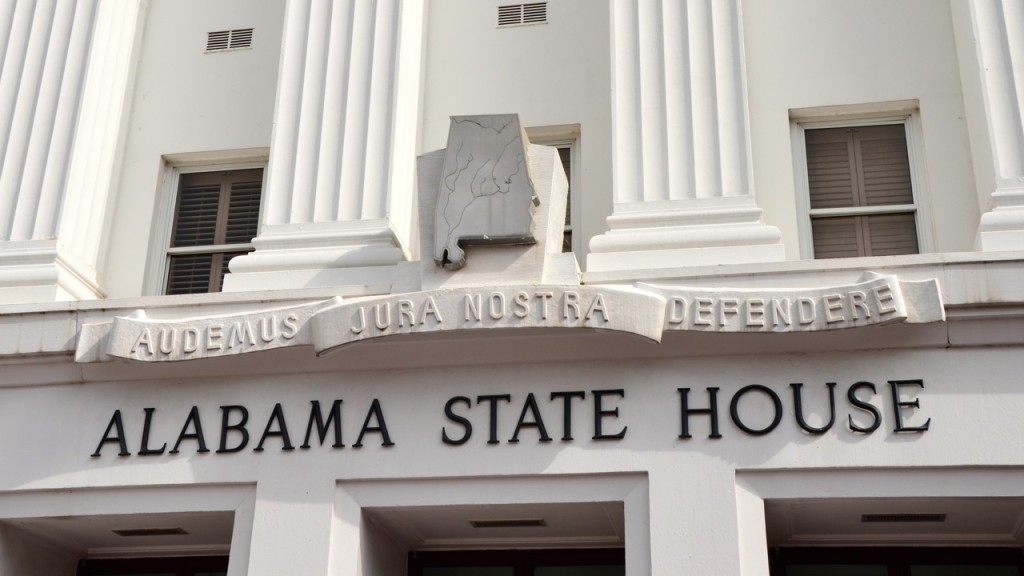GOP House member pre-files bill to nix waivers for able-bodied SNAP work requirements

On Alabama state rep is working to get more able-bodied Alabamians off of the government rolls and back to work. Ahead of the 2018 Legislative session, State Rep. Tommy Hanes (R-Bryant) pre-filed HB6, which prohibits the Alabama Commissioner of the Department of Human Resources from requesting a waiver of federal work requirements for able-bodied adults without dependents who are applicants or recipients of the Supplemental Nutrition Assistance Program (SNAP) formerly known as food stamps. In 2009, the Obama administration passed a stimulus bill that allowed states to apply for waivers from regulations requiring able-bodied adults without dependents to work. Throughout former President Barack Obama‘s tenure, food stamp usage soared. In 2017, Alabama implemented laws requiring food stamp recipients work at least 20 hours per week, enroll in school, or take part in state-approved job training if they receive benefits for more than three months. Turns out the work requirements worked and the state saw large decreases in SNAP enrollment as a result of the work requirements. According to National Review, after Alabama reinstated food-stamp work requirements for able-bodied adults without dependents, the rolls dropped by 85 percent. Now, Hanes is looking to drop the ability to ask for waivers, to require all SNAP recipients, who don’t have dependents, to meet work requirements to continue to receive benefits — which will hopefully encourage more Alabamians to go back to work. This bill requires all able-bodied adults without dependents who are applicants or recipients of SNAP benefits to participate in minimum work requirements, provide documentation of engaging in work training, or participate in volunteer community service and would provide limited exemptions from these work requirements. If passed, it will become effective on the first day of the third month following its passage and approval by Governor Kay Ivey.
Bill giving police access to cellphone location data passes Alabama House

The Alabama House of Representatives on Thursday passed a bill requiring wireless companies in the state to hand over location data to law enforcement agencies upon request, in an emergency situation involving a risk of death or serious bodily harm. Scottsboro-Republican state Rep. Tommy Hanes introduced HB5: the Kelsey Smith Act, which passed 95-0. The legislation is named after Smith, a Kansas teen who was abducted in broad daylight in the parking lot of a Target store and ultimately raped and murdered in June 2007. It was four days between the time she disappeared to the time her cell phone location information was released, and her body was found by the police. The states that have the system in place already have reported several “saves,” where people that have been saved from the use of the law. The Kelsey Smith Act is currently law in 22 other states across the country. Kansas: April 17, 2009 New Jersey: January 29, 2010 Nebraska: March 17, 2010 Minnesota: May 13, 2010 New Hampshire: July 13, 2010 North Dakota: April 8, 2011 Tennessee: April 26, 2012 Hawaii: April 30, 2012 Missouri: July 6, 2012 Pennsylvania: October 22, 2014 Utah: March 27, 2013 West Virginia: April 12, 2013 Colorado: May 13, 2013 Nevada: May 23, 2013 Rhode Island: July 15, 2013 Oregon: March 6, 2014 Arkansas: March 13, 2015 Iowa: May 1, 2015 Washington: May 7, 2015 Louisiana: June 23, 2015 Delaware: August 7, 2015 Indiana: March 21, 2016 The bill next goes to the Alabama Senate for debate.
Alabama legislative preview: April 11 – April 15, 2016

Alabama legislators will return to Montgomery this week to continue the 2016 regular session. The House will convene at 1pm on Tuesday, April 12th, while the Senate will convene at 4pm. This week the House will consider: HB393, which would give the Department of Agriculture and Industries the authority to study, regulate, and tax industrial hemp, and reclassify the plant as separate from marijuana. Sponsored by Ken Johnson (R-Moulton) The Senate version, SB347, is sponsored by Sen. Paul Bussman (R-Cullman) HB218, an effort to require cursive handwriting skills to be taught by the end of the third grade year to “to prepare him or her to enter the world of work and/or to complete course work at the postsecondary level.” Sponsored by Dickie Drake (R-Leeds) HB2, or the “Kelsey Smith Act”, which would require wireless communications service providers to give location information to law enforcement agencies upon request in an emergency situation involving a risk of death or serious bodily harm. Sponsored by Tommy Hanes (R-Scottsboro) The Healthcare Costs sub-committee will meet Tuesday at 10am in room 418 to consider HB158, the Child Care Provider Inclusion Act, which would prohibit the state from discriminating against a child care service provider on the basis that the provider declines to provide a child care service that conflicts with the religious beliefs of the provider. HB158 is sponsored by Rep. Richie Wingo (R-Tuscaloosa) The Senate has yet to publish its special order calendar, but this story will be updated when it becomes available.
House committee approves two bills to loosen Alabama alcohol restrictions

The House Committee on Economic Development and Tourism approved two measures Thursday aimed at loosening alcohol restrictions in the state. SB219 from Sen. William Beasley (D-Clayton) would allow state and retail liquor stores to conduct liquor and wine tastings on premise. The measure would allow 10 percent of stores to do so in the first year and eventually move up to 28 percent within three years. The bill allows for two quarter-ounce tastings of liquor and four one-ounce tastings of wine. Joe Godfrey, Executive Director of the Alabama Citizens Action Program, was on hand to oppose the legislation, urging lawmakers to make it more difficult to get alcohol. “Alcohol is an addictive and mind-altering drug,” Godfrey said. “It destroys homes, it destroys families.” Gina Dearborn, who represented the Distilled Spirits Council, was in favor of the measure. Dearborn noted that 40 states already allow such tastings, and Alabama’s laws would be stricter than most – tastings must begin before 6 p.m. and manufacturers would oversee the tastings at no cost to consumers or retailers. The committee gave the legislation a favorable report by a unanimous vote. HB325 from Rep. James Buskey (D-Mobile) addressed a specific issue concerning Lake Patti Sue in Slocomb. The 160-acre property straddles a wet and dry county and the owner is hoping to sell alcohol at the recreational spot. Buskey’s legislation would allow him to do so, even on portions that sit within the dry county. The bill would make the lake a “commercial development district” and have no bearing on the parts of the county outside of the property. Similar bills have already passed. Again Godfrey objected, asking whether such a move is constitutional. “You’re imposing something on people who have not voted to go wet,” Godfrey said. “We keep inching and, eventually, the plan is for the whole state to be wet. I don’t believe that’s fair to the citizens of that dry county.” Rep. Tommy Hanes (R-Scottsboro), who lives in a dry county, concurred with Godfrey’s reasoning. “It goes against your people if they don’t want it to be wet,” Hanes said. The bill was given a favorable report with Hanes the only one to vote against it.
Alabama legislative agenda preview: March 7 – March 11, 2016

Alabama lawmakers will return to Montgomery Tuesday as the legislative session resumes, with the House convening at 1 p.m. and the Senate an hour later. Both chambers are still planning to tackle the General Fund and Education Trust Fund budgets before spring break, as well as a host of issues slated to be taken up this week. The Senate will debate SB89 from Sen. Arthur Orr (R-Decatur), which would require all Alabama public school students to pass a civics test to graduate – private schools could opt-in if they chose to. Also on the Senate’s agenda is SB148 from Sen. Jim McClendon (R-Springville), which would require all passengers in a vehicle to wear a safety belt. The legislation came up in last week’s session but was stalled due to opposition regarding further legislation on people’s car-riding habits. The Senate will also take up SB114 from Sen. Paul Sanford (R-Sanford), which would regulate “fantasy contests” in the state, and SB14 from Sen. Gerald Allen (R-Tuscaloosa), which would allow people to carry a firearm in their vehicle without a permit. Allen’s legislation was hotly contested in a recent committee hearing, when state law enforcement officers argued that the bill would make their jobs more difficult and dangerous. The House will also take up a bill aimed at regulating so-called “fantasy contests,” as well HB2 from Rep. Tommy Hanes (R-Scottboro), which would require wireless communications providers to supply law enforcement agencies with location information upon request. Perhaps the bills with highest interest to be taken up in the House this week are HB46 from Rep. Alan Boothe (R-Troy), which would allow Alabama distilleries to begin selling bottles for off-premise consumption, and HB13 from Rep. Alan Harper (R-Northport), which would allow the public to vote on whether or not to institute a state lottery. Committee hearings will get underway Tuesday morning before the start of session, though the majority will take place on Wednesday. The Senate Committee on Health and Human Services will hear discussion on two bills that will likely attract the outrage of Democrats – HB45 from Rep. April Weaver (R-Alabaster), which would outlaw the already-illegal practice of selling fetal tissue, and SB9 from Allen, which would prohibit abortions if providers don’t first determine a fetal heartbeat. The Senate Committee on General Fund Finance and Taxation will hear from Sen. Vivian Figures (D-Mobile) regarding SB136, a bill which would put forth a constitutional amendment to add an additional 5-mill tax to state properties, with the proceeds going to help Medicaid. The House Economic Development and Tourism Committee will hold public hearings regarding two alcohol-related bills – SB219 from Sen. William Beasley (R-Clayton), which would allow retail licensees and state liquor stores to conduct liquor and wine tastings, and HB325 from Rep. James Buskey (D-Mobile), which would allow businesses with a building split between wet and dry counties to serve alcohol. The House Committee on General Fund Ways and Means will take up the General Fund via SB125, which has already passed the Senate,
State lottery, guns, wireless data bills coming to state Legislature

With the start of Alabama’s Legislative Session less than a week away, a slew of bills have been prefiled in the House of Representatives. Alabama Rep. Craig Ford (D-Etowah) has prefiled House Bill 10, which would establish an Alabama lottery to fund scholarships, an Alabama Lottery Corp. “to implement and to regulate” a state lottery, and would prohibit the operation of casinos. Proceeds from Ford’s lottery would go into a Lottery Trust Fund and be used to give scholarships to “qualifying students” to attend two- or four-year colleges within the state. The bill specifies that qualified students are those “who are A/B Honor Roll students.” Ford’s bill would also alter part of a constitutional amendment that prohibits the state Legislature to “authorize lotteries or gift enterprises for any purpose.” Rep. Mack Butler (R-Etowah), along with a number of House colleagues, has proposed a constitutional amendment, HB12, to allow persons with a concealed pistol permit to carry weapons on the campuses of public and private universities within the state. The bill also provides for universities to establish rules regarding the storage of such weapons in dormitories or other residential areas, the carrying of weapons on campus, and to prohibit carrying weapons in some cases, though complete prohibition would not be allowed. The law further provides immunity to universities “for damages arising from action or inaction under the requirements of the amendment.” Universities would be required to submit a report each year to the Speaker of the House and the President Pro Tempore of the Senate detailing a description of the rules regarding campus carry and the rationale behind such rules. Butler noted than an additional bill, to be filed at the start of the session, will provide criminal penalties to universities that ban guns on campus. “The people overwhelmingly are embracing it,” Butler said. “It’s becoming crystal clear that the targets are these gun-free zones.” A bill prefiled by Rep. Tommy Hanes (R-Scottsboro) and others, HB2, would require wireless service providers to turn over location information to law enforcement agents in “an emergency situation involving a risk of death or serious bodily harm.” Also known as the Kelsey Smith Act, named for a woman killed in 2007 whose body was found after Verizon Wireless finally cooperated with law enforcement. The bill goes on to say that “law enforcement may monitor from any location in this State location information obtained from a wireless communications provider or device from anywhere the device is located regardless of jurisdiction.” Further, the bill states that “the Alabama Law Enforcement Agency shall obtain contact information from all wireless service providers authorized to do business in this state to facilitate a request from a law enforcement agency for call location information under this section. The bureau shall disseminate the contact information to each state and local law enforcement agency in this state.”


